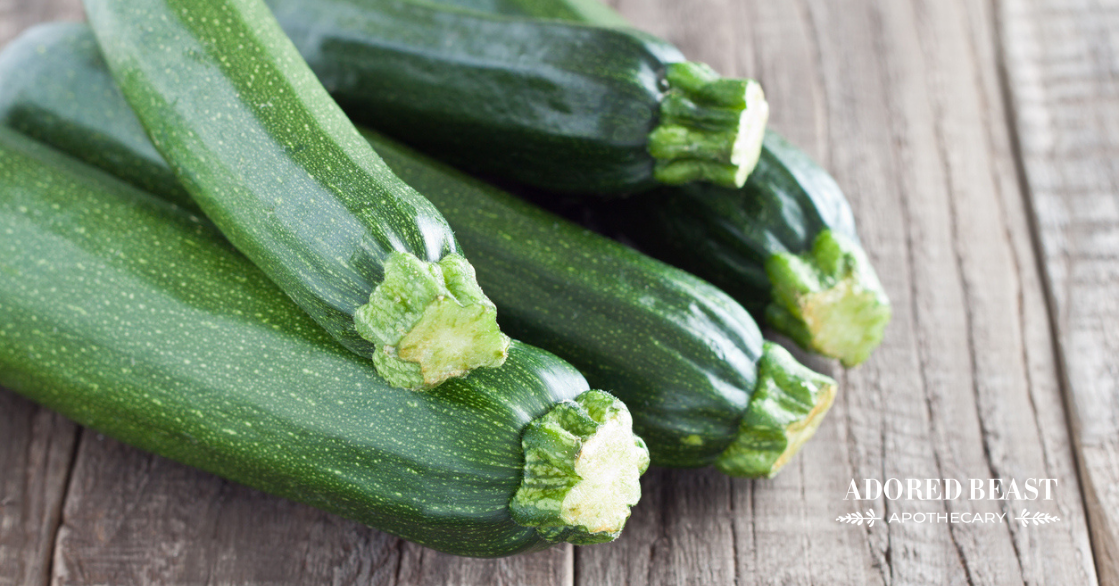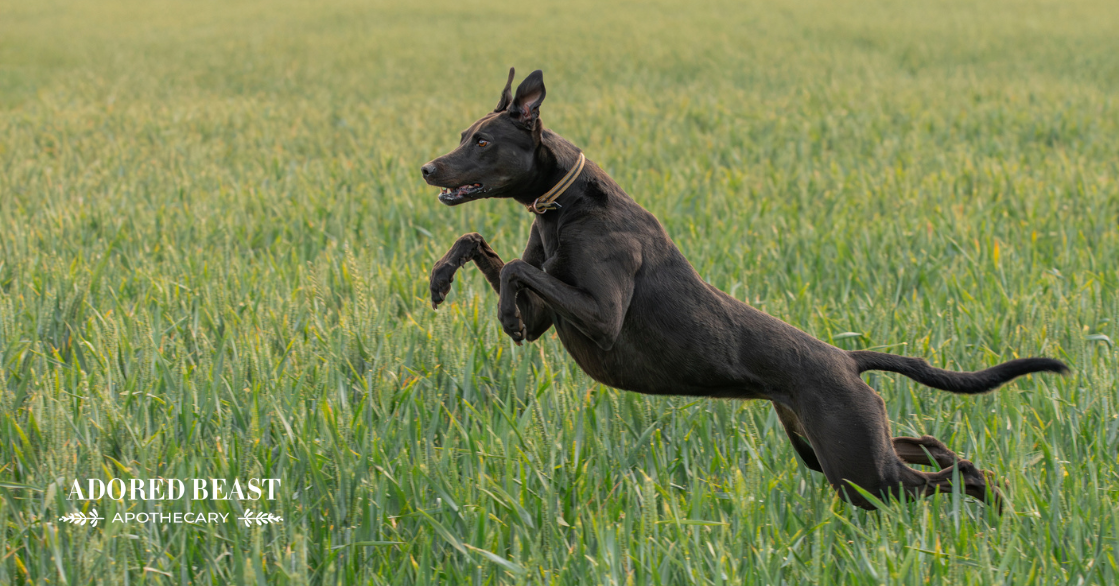When it comes to keeping our canine companions healthy, a balanced, fresh food diet is of the utmost importance.
If you’re anything like me, you incorporate vegetables into your pet’s diet.
Maybe it’s broccoli, maybe it’s cauliflower, maybe it’s asparagus. Or maybe it’s all 3 (and more)!
But what about zucchini? Is it on your list? Can dogs eat zucchini?
In this blog, we’ll explore this fun fave, the nutritional benefits it offers, how to safely feed it, and provide a list of other dog-safe vegetables (and fruits – and we’ll tell you why in a minute) to consider.
Can Dogs Eat Zucchini?
Yes, dogs can eat zucchini! Zucchini is a low-calorie, nutrient-rich food that can be a healthy addition to your dog’s diet.
In fact, it’s one of our favourites, for a variety of reasons… but before we get into that…
Did you know… zucchini is not actually a vegetable! I know, your mind is blown! Botanically, zucchini is classified as a fruit – as are many of the vegetables with seeds that flower. Yes, you’re probably thinking about tomatoes, but cucumbers, pumpkin, and squash also grown from the flower and are considered fruits. Whoa!
including:
- Low in Calories: Zucchini is low in calories, making it an excellent option for dogs watching their weight or on a diet.
- High in Fiber: The high fiber content in zucchini can support digestive health and help regulate bowel movements.
- Vitamins and Minerals: Zucchini contains vitamins C and K, as well as minerals like potassium, which can contribute to your dog’s overall well-being.
- Hydration: Zucchini has a high water content, which can help your dog stay hydrated, especially on hot days.
- Antioxidants: Zucchini contains antioxidants that may aid in protecting your dog’s cells from damage.
- Low Fat: It’s a low-fat option, making it suitable for dogs with dietary restrictions.
- Low Sugar: If you’re watching your dog’s sugar intake, even with natural sources, don’t worry too much about zucchini being a fruit – it’s very low in sugar.
How to Feed Zucchini to Your Dog
When introducing zucchini to your dog’s diet, follow these guidelines:
- Wash and Prepare: Thoroughly wash the zucchini and also peel it and cut off the stock.
- Prepare: Finely chop, blend, steam, or ferment for easier digestibility.
- Cooked or Raw: You can offer zucchini both cooked and raw. Lightly cooked zucchini is easier to digest, but some dogs enjoy the crunch of raw zucchini slices.
- Season with Care: Avoid adding butter or salt or those generic jars of flavour blends. We might like it, but our pups don’t need it. In some cases, seasonings can be beneficial, particularly herbs like parsley or specific spices like ceylon cinnamon that meet your dog’s individual needs. Work with your trusted herbalist or integrative veterinarian on this.
- Moderation: While zucchini is generally safe, it should only be one part of your dog’s balanced diet. Incorporate it as an occasional treat or rotate it with other vegetables (and fruits).
- Monitor for Allergies: As with any new food, watch your dog for any signs of allergies or digestive issues. If your dog doesn’t like it, or it doesn’t agree with them, take it off the list.
- Smaller is Better: When picking zucchini, try to go for smaller ones. The bigger they are, the longer they’ve had to grow, and the more bitter they become. Smaller is definitely better in this case.
Other Dog-Safe Vegetables and Fruits
In addition to zucchini, there are several other vegetables and fruits that are safe and healthy for dogs:
- Melons: All types of melon are safe for dogs. We especially love watermelon on water days because of the hydration component, but melons also contain plenty of valuable vitamins and minerals.
- Sweet Potatoes: Packed with vitamins and fiber, sweet potatoes are a nutritious option when cooked and served plain.
- Apples: Apples contain healthy, valuable prebiotics, as well as fibre and antioxidants.
- Cucumber: High in water content, cucumbers are hydrating and low in calories.
- Berries: Berries, blueberries especially, are packed full of free-radical fighting antioxidants, as well as potassium, magnesium, vitamins C and K, fibre, and even some prebiotics
- Green Beans: Low in calories and high in fiber, green beans can help with weight management.
- Cantaloupe: Cantaloupe is a great source of vitamins C and A, as well as folate, potassium, beta-carotene, and fibre.
- Broccoli: A source of vitamins, minerals, and fiber, broccoli can be a healthy addition to your dog’s diet when served in moderation.
- Pumpkin: Pumpkin is a fibre-rich food that also contains many valuable vitamins and minerals. It’s great for the digestive tract, and can be helpful for both diarrhea and constipation, ironically.
- Mangos: Mango is packed full of vitamins and minerals, including vitamin A, C, and K, potassium, beta-carotene, choline, and magnesium.
- Cabbage: Cabbage leaves are low in calories, but high in vitamins, fibre, and antioxidants – all things we really like!
- Kiwi: Rich in vitamin C, calcium, potassium, and fibre. They are also high in lutein (a nutrient that supports healthy eyes) as well as beta-carotene.
- Cauliflower: Cauliflower is a good source of dietary fiber, vitamin K, and vitamin C.
- Pears: Pears are high in vitamins A and C, copper, potassium, calcium, and magnesium, and potassium, as well as dietary fibre.
We like to think seasonally when we consider what to add to the diet – think about what is in season when you buy. Also, try to buy organic whenever you can, and local, and rotate, rotate, rotate!
Easy Zucchini “Salsa” Recipe
This “salsa” type snack is literally just fruits, vegetables, and loads of fun!
Ingredients:
- 1 cup zucchini (peeled)
- 1/2 cup red bell pepper (seeds and stem removed)
- 1/2 cup purple cabbage
- 1/2 cup cucumber (peeled)
- 1/2 cup fresh parsley
Add everything to the blender and chop it up finely (don’t turn it into a smoothie). You can also do a hand-chop – just make sure it’s finely cut up. Add it on top of your pup’s food for a little kick, about 1/2 tsp to 2 tbsp depending on the size of your animal.
Keep it in the fridge, and use it over the course of 2-3 days.
This makes about 3 cups of food – so cut the amounts if you think it is too much for your pup!
Can dogs eat zucchini? You bet they can! As you can see, there are many reasons to add it into the regular rotation. So, the next time you’re cutting some up for that pasta dish or stir fry, reserve some for your furry friend – and maybe try out a little salsa!












